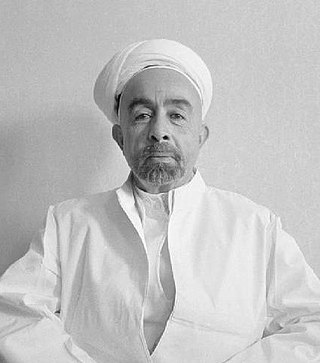
The politics of Jordan takes place in a framework of a parliamentary monarchy, whereby the Prime Minister of Jordan is head of government, and of a multi-party system. Jordan is a constitutional monarchy based on the constitution promulgated on January 8, 1952. The king exercises his power through the government he appoints which is responsible before the Parliament. In contrast to most parliamentary monarchies, the monarchy of Jordan is not ceremonial, with the King having significant influence over the affairs of the country.

Abdullah II bin Al-Hussein is King of Jordan, having ascended the throne on 7 February 1999. He is a member of the Hashemite dynasty, who have been the reigning royal family of Jordan since 1921, and is considered a 41st-generation direct descendant of the Islamic prophet Muhammad.

The Hashemites, also House of Hashim, are the royal family of Jordan, which they have ruled since 1921, and were the royal family of the kingdoms of Hejaz (1916–1925), Syria (1920), and Iraq (1921–1958). The family had ruled the city of Mecca continuously from the 10th century, frequently as vassals of outside powers, and were given the thrones of the Hejaz, Syria, Iraq, and Jordan following their World War I alliance with the British Empire; this arrangement became known as the "Sharifian solution".

Abdullah I bin Al-Hussein was the ruler of Jordan from 11 April 1921 until his assassination in 1951. He was the Emir of Transjordan, a British protectorate, until 25 May 1946, after which he was king of an independent Jordan. As a member of the Hashemite dynasty, the royal family of Jordan since 1921, Abdullah was a 38th-generation direct descendant of Muhammad.

Talal bin Abdullah was King of Jordan from the assassination of his father, King Abdullah I, on 20 July 1951 until his forced abdication on 11 August 1952. As a member of the Hashemite dynasty, the royal family of Jordan since 1921, Talal was a 39th-generation direct descendant of Muhammad.

"The Royal Anthem of Jordan" is the national anthem of Jordan, adopted in 1946. The lyrics were written by ʿAbdel Munʿim al-Rifāʿī, and the music was composed by ʿAbdul al-Qādir al-Tanīr. The first version of the lyrics was very short, as it only contained the first stanza of the current version. Since then, the anthem has been expanded. The abridged version of the anthem is usually used, while the full version is reserved for special occasions.

Rania Al Abdullah is Queen of Jordan as the wife of King Abdullah II.

Hamzah bin Al Hussein, is the fourth son of King Hussein bin Talal of Jordan overall and the first by his American-born fourth wife, Queen Noor. He was named Crown Prince of Jordan in 1999, a position he held until his older half-brother, King Abdullah II, rescinded it in 2004. He is a member of the Hashemite dynasty, the royal family of Jordan since 1921, and is a 41st-generation direct descendant of Muhammad. Hamzah is currently believed to be under house arrest since April 2021, after being accused of attempting to destabilise the Kingdom of Jordan and fomenting unrest. Hamzah renounced his title of prince in April 2022.

Marouf Suleiman al-Bakhit is a Jordanian politician who was twice Prime Minister. He first served as Prime Minister from 27 November 2005 until 25 November 2007 and then again from 9 February 2011 to 17 October 2011. Bakhit also held the position of Jordanian ambassador to Israel and the national security chief. Appointed as Prime Minister by King Abdullah II less than three weeks after the 2005 Amman bombings, Bakhit's main priorities were to maintain security and stability in Jordan. He was reappointed as Prime Minister by the King on 1 February 2011, following weeks of protests.

Hussein bin Abdullah is Crown Prince of Jordan as the son of King Abdullah II and Queen Rania. He is a member of the Hashemite dynasty, the royal family of Jordan since 1921, and is considered to be 42nd-generation direct descendant of the Islamic prophet Muhammad.

The Jordan Football Association is the governing body for football in Jordan. The JFA was awarded best association of the AFC in 2013.
The qualification process for the 2004 AFC Asian Cup football competition began in March 2003. Out of the 45 AFC members, only Cambodia and the Philippines failed to enter for the tournament. Both China, the hosts and Japan, the reigning champions automatically qualified for the finals. The lowest ranked 20 teams were placed in 6 preliminary qualifying groups of 3 and one group of 2, with the group winners joining the remaining 21 teams in 7 groups of 4. The top two of each of these groups qualified for the finals in China.

Prince Ghazi bin Muhammad is a Jordanian prince and a professor of philosophy. He is the son of Prince Muhammad bin Talal of Jordan and his first wife, Princess Firyal. He is a grandson of King Talal of Jordan and thus a first cousin of King Abdullah II and eighteenth in the line of succession to the Jordanian throne. He is well known for his religious initiatives, about which a book was published in 2013.
The 1944 Jordanian League (known as The Jordanian League, was the first season of Jordan League. The Jordan Premier League first kicked off with Al-Faisaly Club winning the inaugural event held under the patronage of King Abdullah I. Four teams competed in the league : Al-Ahli, Jordan Club, Homentmen and Al-Faisaly.

Samir Zaid al-Rifai is a Jordanian politician who was the 38th Prime Minister of Jordan from 14 December 2009 to 9 February 2011.

The 2010 WAFF Championship was the 6th edition of the West Asian Football Federation Championship, an international tournament for selected West Asian countries and territories. It was hosted by Jordan, after Lebanon was deemed not capable of hosting. The competition was eventually won for the first time by Kuwait, after beating defending champions, Iran.

The Order of the Star of Jordan or The Order of Hussein ibn Ali is an award and military decoration of the sovereign state of Jordan and is awarded for military or civil merit. It was founded in honour of his father, by King Abdullah I on 22 June 1949. The Grand Cordon class was introduced by Hussein of Jordan on 23 September 1967. It is awarded to members of the Royal Family (Hashemite) in two classes. The award possesses 5 Grades; plus a medal. These may be awarded to anyone deserving. A Ribbon is issued for members of the military; Dark green with narrow purple edge stripes. Recipients use the postnomials SJ which are altered depending on the class awarded; GCSJ for Grand Cordon; GOSJ for Grand officer; CSJ for Commander; OSJ for Officer; and KSJ for Knight.

The Jordanian protests were a series of protests in Jordan that began in January 2011, and resulted in the firing of the cabinet ministers of the government. In its early phase, protests in Jordan were initially against unemployment, inflation, corruption. along with demanding for real constitutional monarchy and electoral reforms.

The 2016 FIFA U-17 Women's World Cup was the fifth edition of the FIFA U-17 Women's World Cup, the biennial international women's youth football championship contested by the under-17 national teams of the member associations of FIFA. The tournament was held in Jordan from 30 September to 21 October 2016.

Hashemite custodianship refers to the Jordanian royal family's role in tending Muslim and Christian holy sites in the city of Jerusalem. The legacy traces back to 1924 when the Supreme Muslim Council, the highest Muslim body in charge of Muslim community affairs in Mandatory Palestine, chose Hussein bin Ali as custodian of Al-Aqsa. The custodianship became a Hashemite legacy administered by consecutive Jordanian kings.

















